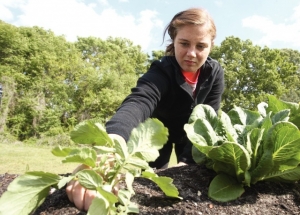Agriculture program brings students to MOC
By Kelly Corbett
Published in News on April 29, 2012 1:50 AM

News-Argus/ALLISON CARTER
Allison Kee, a freshman at Mount Olive College, pulls weeds out of the Fitness Garden Wednesday at the college. Ms. Kee and other agricultural education students tend to the garden as a part of a work-study program. The garden produces a variety of vegetables.
Alaina Airheart decided to go to school at Mount Olive College because she said it felt like home, with its smaller class sizes and friendly peers. But she was also attracted to the college because of the opportunity it would allo her and other students to continue studying and working in agriculture.
Her goal, the Mount Pleasant native said, is to one day be an agriculture teacher.
"I have always been in the (agriculture) field since I was in high school," she said. "I've worked with horses since the age of seven."
Sandy Maddox, director of the Lois G. Britt Agribusiness Center, said the agriculture education and agribusiness programs have both grown tremendously since their inception, and that a recent banquet organized by the Collegiate Future Farmers of America was an opportunity to recognize the sponsors who have made those programs so successful at the college.
"The students wanted to do (the banquet), because they realize without those partnerships, without that support, they could not do what it is that they're allowed to do, and to grow, not only as students at Mount Olive College, but as young people who will soon be employed in the agriculture industry across the state," Ms. Maddox said.
Ms. Airheart, now a junior agriculture education major, is also CFFA president at the college, which is one of only three in state to have such an organization, and helped spearhead the banquet.
"That was one of my personal goals this year, that we could have this banquet," she said.
She said it is up to future CFFA officers to decide whether or not they would like to hold another banquet, but that she hopes it will be held about every five years to recognize program's growth and accomplishments so it remains "special."
The two agriculture programs are relatively new to the college. The agriculture education program began five years ago and the agribusiness program is celebrating a decade, after it was started by former president J. William Byrd in 2002.
"Our student numbers are primarily North Carolina kids and those kids are going to stay in North Carolina, and that's very important to us to be able to provide them an education which is going to go back to the communities from which they come," Ms. Maddox said. "I think that's the important thing about what Mount Olive College does in our agriculture program and in our other programs here at the college as well."
In North Carolina, agriculture and agribusiness is a $70 billion a year industry, and family farms are not just things of the past.
Agriculture education majors typically go back into the public school system as teachers, while agribusiness majors either move back home to work on their family farms, become entrepreneurs or get involved with other agribusiness companies.
Several of the students also have remained in school to get their master's degrees, Ms. Maddox said.
The agribusiness center has partnered with many local agriculture businesses, such as Monsanto, Hog Slat and Murphy-Brown, which employ many of the students through internships.
"They've given them hands-on experience putting the classroom theory that they are learning to work in an actual working environment," Ms Maddox said. "When you've got businesses coming to the college and asking to partner and be part of an internship, like Southeastern Grain did, that's the kind of thing you know you're finally making an impact."
She said the students are the best recruiters for the programs, and they help get the word out to local high school students.
"I carry them with me as often as I can, because they're telling the true story of what Mount Olive College has meant to their life, what it's meant to them, and they can do that with more articulation than I can," Ms. Maddox said. "We've gone from a handful of students in both curriculums to about 50 to 55 in our (agribusiness) and (agriculture education) programs combined. We're excited about that. I think it's a great opportunity for the college to bring in kids and educate them in (agriculture) then put them back into the work force that they're coming from."
She said the program still has a long way to go, but she knows what she wants to see happen in the future with the aid of partnerships and grants.
"I'd like for us in the next five years to have enrollment of our (agriculture) program, both (agriculture) programs, over 100 students. That would be my goal over the next three to five years is to see that type of growth," Ms. Maddox said.
But increasing the number of her students is only one item on her list for the future of the programs.
"If I had a dream, I would have an (agriculture) mechanic shop and then I would expand our arboretum and possibly a small farm, but that's a dream," Ms. Maddox said. "We've got a lot of things that we're looking to the future to do. It just takes time and I'm very pleased with the progress that we've made."
